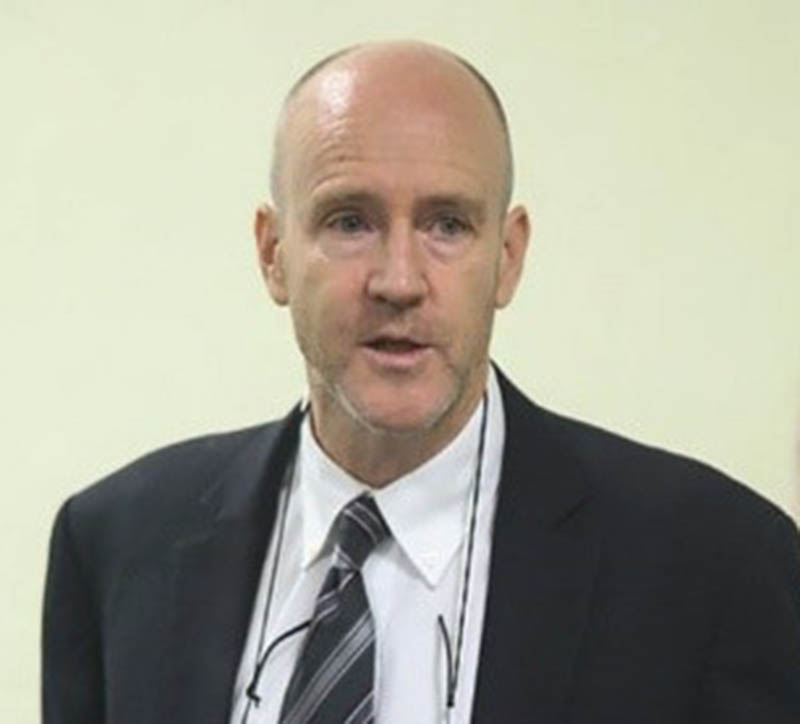Today the world observes International Day against Trafficking in Persons (TIP), and with a focus on those directly affected, the International Organization for Migration (IOM) is urging holistic victim-centered support.
Significantly, Guyana’s IOM Chief of Mission Robert Natiello has stressed the importance of financial independence for victims, which he said is crucial in ensuring they do not fall prey to traffickers in the future.
Describing the exploitation as often being “very, very brutal,” Natiello, who is also IOM’s Regional Coordination Officer for the Caribbean, said that human trafficking has a migration component which has to be tackled through a comprehensive approach.
He said it is not the work of one organisation or one entity; but rather requires collaboration with all stakeholders.
Natiello made the statements while participating in a radio discussion held by the local judiciary on Thursday as part of its public sensitisation campaign aimed at eradicating the scourge of TIP, which it described as “modern-day slavery.”
Notwithstanding the instrumental role to be played by stakeholders, however, the regional coordinator was keen in pointing that the victim must be heard— as often times their story gets lost.
Keeping the focus on them, Natiello in underscoring the nature of human trafficking said that victims of this crime are often persons seeking better opportunities for themselves and families and in a situation “of economic vulnerability,” where they are looking for better opportunities.
“…And they become easy prey for the traffickers,” he said, before adding, “So victims are vulnerable…they are looking for a better opportunity…they are often struggling, and they are exploited.”
It was against this background that he said victims need holistic victim-centered support where their voices are heard and where they make the decisions on what their needs are for reintegration into society.
Natiello said that the collective effort in addressing the migration challenges associated with TIP “requires the work of the private sector, government, and other UN agencies and actors…and civil society organizations.”
He shared that IOM has been working with government on a United States-funded project which commenced back in 2016 and concluded last year—the Office to Combat and Monitor Trafficking in Persons.
Another initiative of IOM, he said, was the establishment of a national network on trafficking in persons, which involved bringing civil society actors together to assist victims of trafficking.
On this point, he said, in neighbouring Venezuela, migrants who are struggling “to find enough food to eat, medicines…and coming to Guyana in these extremely vulnerable situations…become easy prey for traffickers.
He said that the situation of trafficking of Venezuelans is one of concern for IOM and all stakeholders, given the increase in the number of cases.
Noting his organization’s commitment to working with all local stakeholders, Natiello said that the victims need assistance in overcoming “this tragedy” even as he said that IOM also offers economic support to enable migrants to “take the next step” to establishing financial independence.
This is particularly crucial, he said, to ensure that they do not fall victim to traffickers in the future.
As part of its efforts to combat TIP, the judiciary has placed significant emphasis on reporting the crime, recognising underreporting as one of the major hindrances.
To boost reporting, the Guyana Association of Women Judges (GAWJ) on Thursday’s radio programme made an appeal specifically to undocumented foreign victims to come forward, assuring that as part of the protective measures offered to victims, they would not be prosecuted for immigration-related violations.
“So we would like persons who may be victims out there and may be undocumented in our country to know that they will not be prosecuted and that they should not be afraid to come forward,” urged Second Vice President of the GAWJ, Magistrate Christel Lambert.
GAWJ said it will be distributing 150 TIP posters in each of the 10 Administrative Regions and given the presence of Cubans, Venezuelans and Brazilians here, those posters will not only be in English, but Spanish and Portuguese as well.
Meanwhile, to encourage reporting, Chief Magistrate and President of GAWJ Ann McLennan, had shared the TIP 24-hour hotline numbers, which are 227-4082 and 623-5030. Alternatively she said that the Guyana Police Force can be contacted on 225-3650; and that the Spanish hotline can be reached on 624-0079.
She had said it is important for the public to know what TIP “looks like,” and shared what she described as telltale signs that a person is being trafficked.
On that point she said signs to look for are persons who are forced to beg, bearing frequent injuries or signs of abuse, appear malnourished, work for long hours with hardly any rest and are paid little to no remuneration at all.
She said that avoiding eye-contact and social interactions and not being allowed to speak to family members or others are also indicators that a person may be a victim.
TIP is an offence in Guyana under Section 3(1) of the Combating of Trafficking in Persons Act.
Persons who are convicted face a penalty in the Magistrate’s Court if tried there, of imprisonment from three to five years and in the High Court from five years to as much as a sentence of life in prison.
Additionally, such convicts are required to pay restitution to their victims, which the Chief Magistrate had explained would include medical treatment, cost of physical and occupational therapy, attorneys’ fees and other losses suffered by the victims.
The theme for this year’s observances is “Use and Abuse of Technology,” focusing on the role of technology as a tool that can both enable and impede human trafficking.
Natiello in his contribution to the public discourse shared that IOM has been working on human trafficking issue for more than three decades now and has over the years assisted more than 100,000 victims across the world.
He said that the organization is an international, inter-government one, with a presence in over 100 countries and with 175 member states. Guyana joined in 2010.






